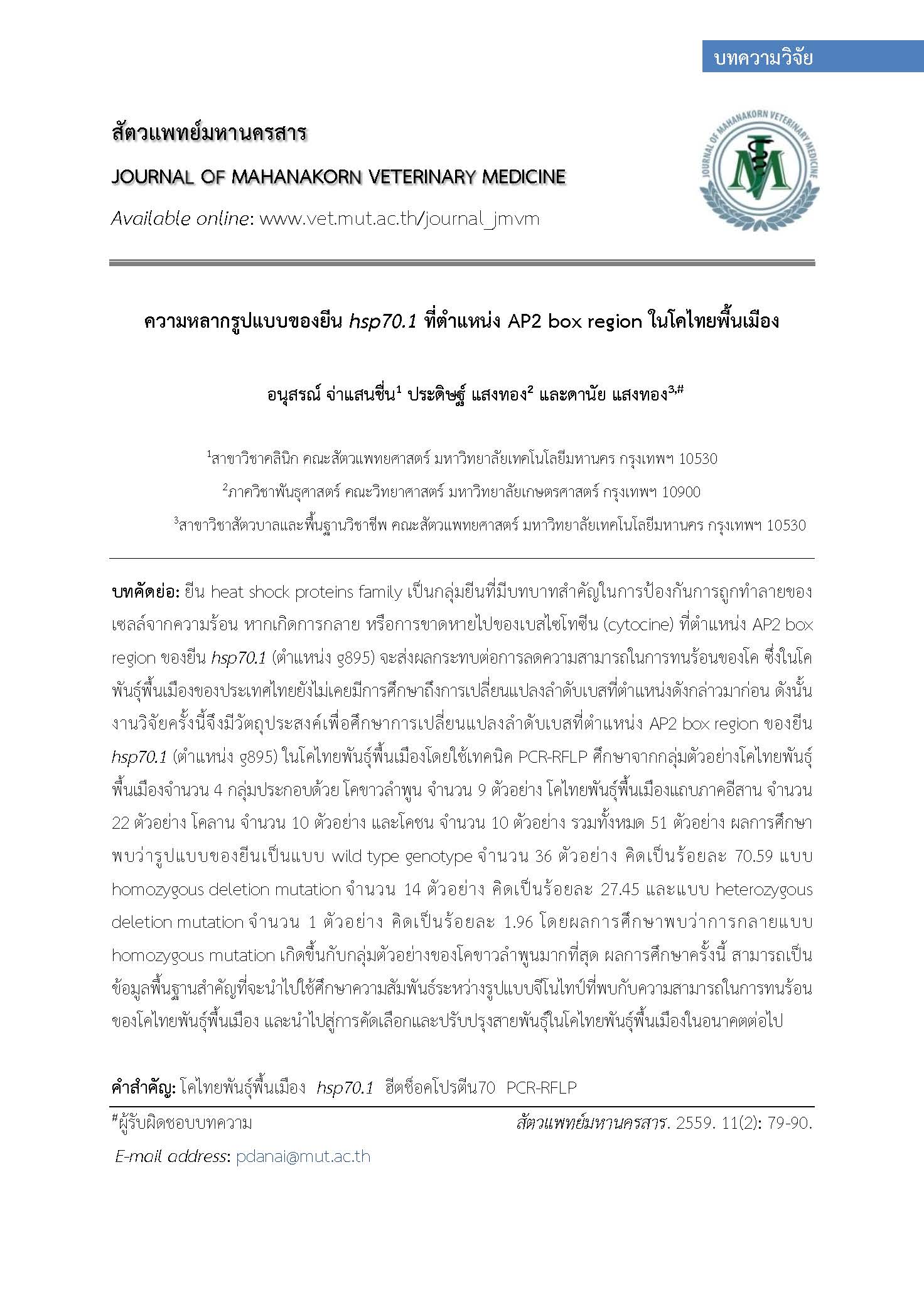ความหลากรูปแบบของยีน hsp70.1 ที่ตำแหน่ง AP2 box region ในโคไทยพื้นเมือง
Main Article Content
บทคัดย่อ
ยีน heat shock proteins family เป็นกลุ่มยีนที่มีบทบาทสำคัญในการป้องกันการถูกทำลายของเซลล์จากความร้อน หากเกิดการกลาย หรือการขาดหายไปของเบสไซโทซีน (cytocine) ที่ตำแหน่ง AP2 box region ของยีน hsp70.1 (ตำแหน่ง g895) จะส่งผลกระทบต่อการลดความสามารถในการทนร้อนของโค ซึ่งในโคพันธุ์พื้นเมืองของประเทศไทยยังไม่เคยมีการศึกษาถึงการเปลี่ยนแปลงลำดับเบสที่ตำแหน่งดังกล่าวมาก่อน ดังนั้นงานวิจัยครั้งนี้จึงมีวัตถุประสงค์เพื่อศึกษาการเปลี่ยนแปลงลำดับเบสที่ตำแหน่ง AP2 box region ของยีน hsp70.1 (ตำแหน่ง g895) ในโคไทยพันธุ์พื้นเมืองโดยใช้เทคนิค PCR-RFLP ศึกษาจากกลุ่มตัวอย่างโคไทยพันธุ์พื้นเมืองจำนวน 4 กลุ่มประกอบด้วย โคขาวลำพูน จำนวน 9 ตัวอย่าง โคไทยพันธุ์พื้นเมืองแถบภาคอีสาน จำนวน 22 ตัวอย่าง โคลาน จำนวน 10 ตัวอย่าง และโคชน จำนวน 10 ตัวอย่าง รวมทั้งหมด 51 ตัวอย่าง ผลการศึกษาพบว่ารูปแบบของยีนเป็นแบบ wild type genotype จำนวน 36 ตัวอย่าง คิดเป็นร้อยละ 70.59 แบบ homozygous deletion mutation จำนวน 14 ตัวอย่าง คิดเป็นร้อยละ 27.45 และแบบ heterozygous deletion mutation จำนวน 1 ตัวอย่าง คิดเป็นร้อยละ 1.96 โดยผลการศึกษาพบว่าการกลายแบบ homozygous mutation เกิดขึ้นกับกลุ่มตัวอย่างของโคขาวลำพูนมากที่สุด ผลการศึกษาครั้งนี้ สามารถเป็นข้อมูลพื้นฐานสำคัญที่จะนำไปใช้ศึกษาความสัมพันธ์ระหว่างรูปแบบจีโนไทป์ที่พบกับความสามารถในการทนร้อนของโคไทยพันธุ์พื้นเมือง และนำไปสู่การคัดเลือกและปรับปรุงสายพันธุ์ในโคไทยพันธุ์พื้นเมืองในอนาคตต่อไป
Article Details
เอกสารอ้างอิง
จักรกริช เจริญศิลป์ สุภร กตเวทิน ยุพินผาสุข และ สุรางคนา สุขเลิศ. 2555. การตอบสนองทางสรีรวิทยาและปริมาณ HSP70 ในเม็ดเลือดขาวของโคพื้นเมืองไทยต่อสภาพอากาศในรอบวัน. แก่นเกษตร. 40 ฉบับพิเศษ 2: 377-380.
พิชิต ชูเสน สุวิช บุญโปร่ง และ ชำนาญ ดงปาลี. 2553. แนวโน้มทางพันธุกรรมลักษณะความสมบูรณ์พันธุ์ของโคขาวลำพูน. E-Journal สำนักพัฒนาพันธุ์สัตว์ กรมปศุสัตว์. เข้าถึงได้จาก http://e-journal.dld.go.th/ ?p=642 (19/6/2559)
อุมาพร แพทย์ศาสตร์. 2548. ความหลากหลายของยีนฮีทช็อคโปรตีน 70 90 และยีนกลูโคคอร์ติคอยด์รีเซพเตอร์ในโคพื้นเมืองไทยและโคนมลูกผสม. วิทยานิพนธ์ ปริญญาวิทยาศาสตร์มหาบัณฑิต (เทคโนโลยีชีวภาพเกษตร). บัณฑิตวิทยาลัย มหาวิทยาลัยเกษตรศาสตร์. หน้า 81
Basirico, L., Morera, P., Primi, V., Lacetera, N. and Nardone, A. 2011. Cellular thermotolerance is associated with heat shock protein 70.1 genetic polymorphisms in Holstein lactation cows. Cell Stress Chaperon. 16: 441-448.
Beatty, D.T., Barnes, A., Taylor, E., Pethick, D., McCarthy, M. and Maloney, S.K., 2006. Physiological responses of Bostaurus and Bosindicus cattle to prolonged, Continuous heat and humidity. J. Anim. Sci. 84: 972-985.
Charoensook, R., Gatphayak, K., Sharifi, A.R., Chaisongkram, C., Brenig, B. and Knorr, C. 2012. Polymorphisms in the bovine HSP90AB1 gene are associated with heat tolerance in Thai indigenous cattle. Trop. Anim. Health Prod. 44: 921-928.
Chen, T., Guo, J., Han, C., Yang, M. and Cao, X. 2009. Heat shock protein 70, Released from heat stressed tumor cell, Initiates antitumor immunity by inducing tumor cell chemokine production and activating dendritic cells via TLR4 pathway. J. Immunol. 182: 1449-1459.
Deb, R., Sajjanar, B., Singh, U., Kumar, S., Brahmane, M.P., Singh, R., Sengar, G. and Sharma, A. 2013. Promoter variants at AP2 box region of hsp70.1 affect thermal stress response and milk production traits in Frieswal cross bred cattle. Gene. 532: 230-235.
Deb, R., Sajjanar, B., Singh, U., Kumar, S., Singh, R., Sengar, G. and Sharma A. 2014. Effect of heat stress on the expression profile of Hsp90 among Sahiwal (Bos indicus) and Frieswal (Bos indicus × Bos taurus) breed of cattle: A comparative study. Gene. 536: 435-440.
Hansen, P.J. 2004. Physiological and cellular adaptations of zebu cattle to thermal stress. Anim. Reprod. Sci. 82-83: 349-360.
Hartwell, L. H., Hood, L., Goldberg, M.L., Reynolds, A.E. and Silver, L.M. 2011. Genetics From Genes to Genomes. 4th edition. McGraw-Hill company. New York. 730 p.
Kregel, K.C. 2002. Molecular Biology of Thermoregulation Invited Review: Heat shock proteins: modifying factors in physiological stress responses and acquired thermotolerance. J. Appl. Physiol. 92: 2177-2186.
Matute, D.R. 2013. The role of founder effects on the evolution of reproductive isolation. J. Evol. Biol. 26(11): 2299-2331.
Ravagnolo, O., Misztal, I. and Hoogenboom, G. 2000. Genetic component of heat stress in dairy cattle, development of heat index function. J. Dairy Sci. 83: 2120-2125.
Rensis, F.D. and Scaramuzzi, R.J. 2003. Heat stress and seasonal effects on reproduction in the dairy cow: A review. Theriogenology. 60: 1139–1151.
Schwerin, M., Sanftleben, H. And Grupe, S. 2003. Genetic predisposition for productive life is associated with functional inactivation of a AP2-binding site in the promoter of the stress protein 70.1-encoding gene in cattle. Arch. Tierz. Dummerstorf. 46(2): 177-185.
Sonna, A. Larry, Fujita, J., Gaffin, L. Stephen, and Lilly, M. Craig. 2002. Invited review: Effects of heat and cold stress on mammalian gene expression. J. Appl. Physiol. 92: 1725–1742.
Xiong, Q., Chai, J., Xiong, H., Li, W., Huang, T., Liu, Y., Sua, X., Zhang, N., Li, X., Jiang, S. and Chen, M. 2012. Association analysis of HSP70A1A haplotypes with heat tolerance in Chinese Holstein cattle. Cell Stress Chaperon. 18: 711-718.


